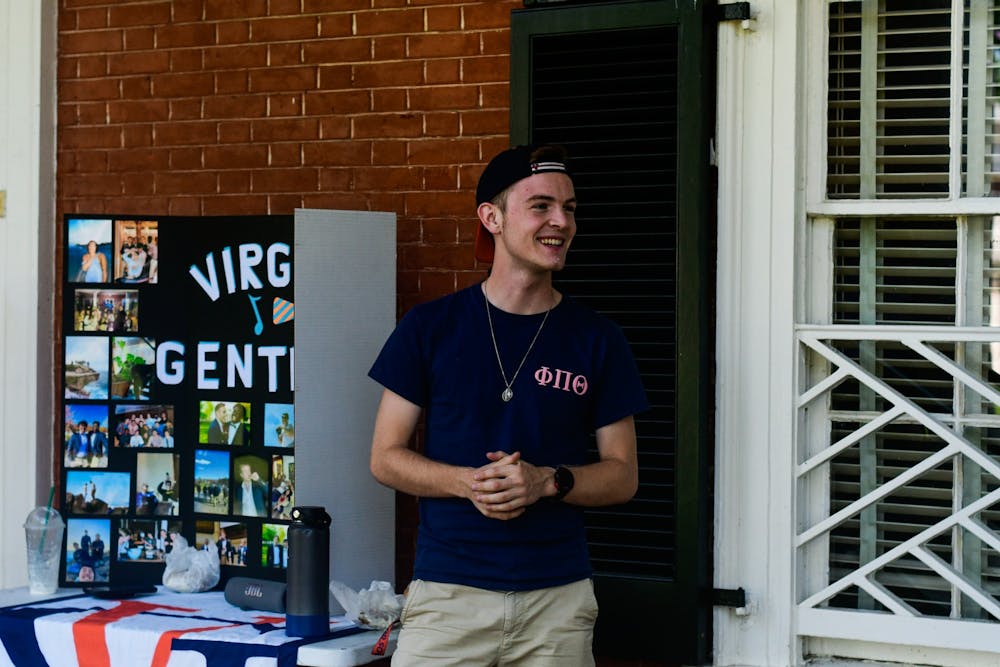Each year, fall a cappella auditions bring clusters of singers to the Lawn. Some are current members of one of the University’s 14 a cappella groups, eager for talented new recruits. Others are hopeful yet nervous auditionees, making their way around to audition for as many groups as possible.
For former choir members, theater kids or just people who love to sing, the a cappella community is the place to be. Each group creates and performs their own arrangements made only for voices — no instruments.
At the University, a cappella groups originated in 1953 with the Virginia Gentlemen, an all-tenor and bass group that remains very prominent on Grounds today, still with a high caliber of musical talent and classic orange-and-blue striped bow ties.
Dean Barton, third-year College Student and current music director, knew he wanted to audition for the group before even coming to Grounds.
“Micah Iverson was on season 18 of The Voice, and he was also in the Virginia Gentlemen, Barton said. “I saw him on The Voice and I was like, ‘Oh, that's what I want to do.’”
At this year’s auditions, Barton is hoping to find people who are passionate about the group, which he considers family.
“Just someone that really enjoys singing, can hold a pitch and is just generally excited to be a part of a cappella at U.Va.,” Barton said.
Fortunately, this year’s fall auditions brought out many eager prospective members from all classes. Most new auditionees know the notable reputation of the University’s a cappella community, and, like auditionee and first-year College student Natalia Leaf, they see auditioning for a cappella as a way to continue a love of performing.
“I've always wanted to be in an a cappella group,” Leaf said. “I love to sing and perform, and I’ve heard a lot of good things about the a cappella scene here.”
With so many groups in the a cappella community, every singer can find the place they feel they belong. Though many groups on Grounds focus traditionally on Western pop, others bring different styles to the table.
Fourth-year College student Medha Prakash is the President of Ektaal, the University’s only South Asian-American Fusion a cappella group.
“I think what makes Ektaal really special is just the diversity of genres that we hit,” Prakash said. “All of our members have such diverse stories … and they bring their music taste and contribute to our group, which is absolutely phenomenal.”
This year brought back the traditional pre-pandemic audition process, after having slightly modified auditions last year and completely online auditions the year before. After filling out an audition form and waiting outside in the summer heat, the auditionee steps into a group’s Lawn room, greeted by three or four smiling faces, air conditioning and a piano. Though each group may carry out the initial audition slightly differently, the basic structure remains the same.
“We typically have auditionees come in, they sing scales up and down and then they do pitch recalls,” said Liza Harold, fourth-year Engineering Student and vice-president of Harmonious Hoos. “We play a few notes for them and they just sing it back to us … then they sing the solos they prepared, and if they can beat box, we ask them to beat box.”
Aside from talent, testing an auditionee’s personality is almost as important. If a group likes a particular auditionee, they may invite them to a social callback as well as a singing callback. The social callback is designed to help the auditionees get to know the group’s dynamic and to hopefully alleviate some of the stress of the audition process by making a few new friends.
The singing callback takes the audition to the next level, where auditionees are typically asked to learn part of an a capella arrangement and sing it with the group, along with preparing solo songs. While the talent of the auditionees gets them past the first round, blending with existing members, both musically and socially, is what gets auditionees into the group.
Current members of groups know first-hand how stressful this audition process can become, and they try their best to alleviate some of that pressure by making sure auditionees feel welcome throughout the process. Hoos in Treble, one of the University’s all-treble a cappella groups, even set up a waiting room next to their audition room this year where auditionees could drink tea with some of the “Hittas” — current members of the group.
“I feel like the audition process can be very, very intimidating for most people,” said Deborah Yu, president of Hoos in Treble, fourth-year Education and Batten student. “I know I was very intimidated my first year. So we really wanted people to feel comfortable and to get to know us before they head into the audition room…And after [the audition], we try to just make sure you felt good about it before you leave.”
Despite the differences among the groups, many members came to a consensus on the top piece of advice for their incoming auditionees — audition for as many groups as possible.
“There are so many [groups] here at U.Va., and they're all amazing,” said Harold. “So I guess just cast your net wide and have fun.”
With another round of auditions in the books, one thing is certain — the a cappella scene at the University is thriving, and the groups hope the new members they choose will continue their tradition of excellence in both music and camaraderie.







